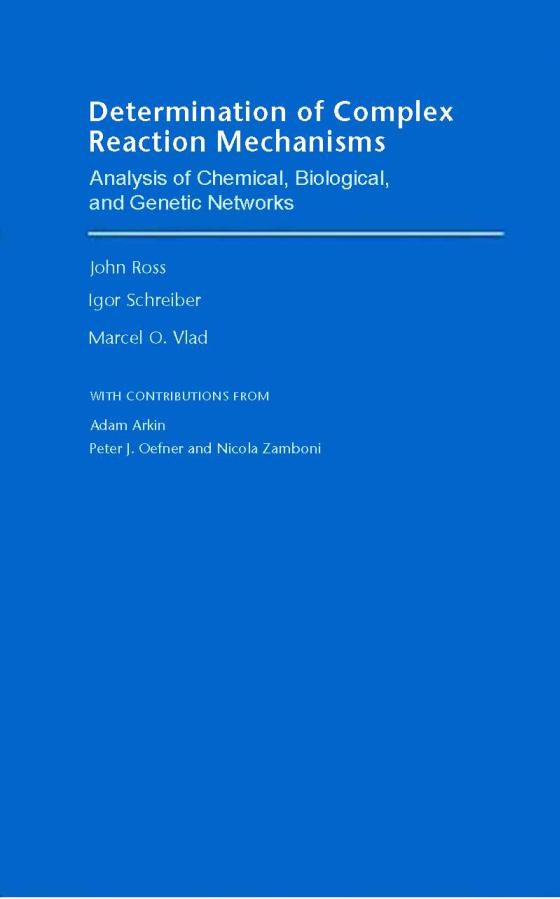
- •Copyright © 2006 by Oxford University Press, Inc.
- •Contents
- •1 Introduction
- •References
- •2.1 Macroscopic, Deterministic Chemical Kinetics
- •2.2 Disordered Kinetics
- •2.3 Fluctuations
- •References
- •3 A Brief Review of Methodology for the Analysis of Biochemical Reactions and Cells
- •3.1 Introduction
- •3.2 Measurement of Metabolite Concentrations
- •3.3 Principles and Applications of Mass Spectrometry
- •3.5 Fluorescent Imaging
- •3.6 Conclusions
- •References
- •4.1 Chemical Neurons and Logic Gates
- •4.2 Implementation of Computers by Macroscopic Chemical Kinetics
- •4.3 Computational Functions in Biochemical Reaction Systems
- •References
- •5.1 Theory
- •5.2 An Example: The Glycolytic Pathway
- •References
- •6 Experimental Test of the Pulse Perturbation Method for Determining Causal Connectivities of Chemical Species in a Reaction Network
- •Reference
- •Discussion
- •References
- •References
- •9 Density Estimation
- •9.1 Entropy Metric Construction (EMC)
- •9.2 Entropy Reduction Method (ERM)
- •References
- •10 Applications of Genetic Algorithms to the Determination of Reaction Mechanisms
- •10.1 A Short Primer on Genetic Algorithms
- •10.2 Selection of Regulation of Flux in a Metabolic Model
- •10.3 Evolutionary Development of Biochemical Oscillatory Reaction Mechanisms
- •10.5 Summary
- •References
- •11 Oscillatory Reactions
- •11.1 Introduction
- •11.2 Concepts and Theoretical Constructs
- •11.3 Experiments Leading to Information about the Oscillatory Reaction Mechanism
- •11.4 Examples of Deduction of Reaction Mechanism from Experiments
- •11.5 Limits of Stoichiometric Network Analysis
- •References
- •12.1 Lifetime Distributions of Chemical Species
- •12.2 Response Experiments and Lifetime Distributions
- •12.3 Transit Time Distributions in Complex Chemical Systems
- •12.4 Transit Time Distributions, Linear Response, and Extracting Kinetic Information from Experimental Data
- •12.5 Errors in Response Experiments
- •12.7 Conclusions
- •References
- •13.1 Clustering
- •13.2 Linearization in Various Forms
- •13.3 Modeling of Reaction Mechanisms
- •13.4 Boolean Networks
- •13.5 Correlation Metric Construction for Genetic Networks
- •13.6 Bayesian Networks
- •13.7 Some Other Illustrative Approaches
- •References
- •Index

Determination of Complex
Reaction Mechanisms
This page intentionally left blank

Determination of Complex
Reaction Mechanisms
Analysis of Chemical, Biological,
and Genetic Networks
John Ross
Department of Chemistry, Stanford University
Igor Schreiber
Department of Chemical Engineering,
Prague Institute of Chemical Technology
Marcel O. Vlad
Department of Chemistry, Stanford University, and
Center for Mathematical Statistics, Romania
WITH CONTRIBUTIONS FROM
Adam Arkin
Department of Bioengineering,
University of California, Berkeley
Peter J. Oefner and Nicola Zamboni
Stanford Genome Technology Center,
Stanford University
2006

Oxford University Press, Inc., publishes works that further Oxford University’s objective of excellence
in research, scholarship, and education.
Oxford New York |
|
|
|
|
|
|
||
Auckland |
Cape Town |
Dar es Salaam Hong Kong |
Karachi |
|||||
Kuala Lumpur |
Madrid |
Melbourne |
Mexico City |
Nairobi |
||||
New Delhi |
Shanghai |
Taipei Toronto |
|
|
|
|||
With offices in |
|
|
|
|
|
|
|
|
Argentina |
Austria Brazil |
Chile |
Czech Republic |
France Greece |
||||
Guatemala |
Hungary |
Italy |
Japan |
Poland |
Portugal |
Singapore |
||
South Korea |
Switzerland |
Thailand |
Turkey |
Ukraine |
Vietnam |
|||
Copyright © 2006 by Oxford University Press, Inc.
Published by Oxford University Press, Inc.
198 Madison Avenue, New York, New York 10016 www.oup.com
Oxford is a registered trademark of Oxford University Press
All rights reserved. No part of this publication may be reproduced, stored in a retrieval system, or transmitted, in any form or by any means, electronic, mechanical, photocopying, recording, or otherwise,
without the prior permission of Oxford University Press.
Library of Congress Cataloging-in-Publication Data Ross, John, 1926–
Determination of complex reaction mechanisms : analysis of chemical, biological, and genetic networks / John Ross, Igor Schreiber, Marcel O. Vlad ; with contributions from Adam Arkin, Peter J. Oefner, and Nicola Zamboni.
p. cm.
Includes bibliographical references and index. ISBN-13: 978-0-19-517868-5
ISBN 0-19-517868-8
1. Chemical kinetics. |
2. Reaction mechanisms (Chemistry) 3. Chemical reaction, |
Conditions and laws of. I. Schreiber, Igor. II. Vlad, Marcel O. III. Title. |
|
QD502.5.R67 2005 |
|
541 .394—dc22 |
2005001379 |
9 8 7 6 5 4 3 2 1
Printed in the United States of America on acid-free paper
We dedicate this book to
our students, our coworkers, and our families
This page intentionally left blank

Contents
1Introduction, 1
1.1Some Basic Definitions, 3
1.2Introduction to Classical Identification, 4
2Introduction to Chemical Kinetic Processes, 7
2.1Macroscopic, Deterministic Chemical Kinetics, 7
2.2Disordered Kinetics, 9
2.3Fluctuations, 9
3A Brief Review of Methodology for the Analysis of Biochemical Reactions and Cells, 11
3.1Introduction, 11
3.2Measurement of Metabolite Concentrations, 11
3.3Principles and Applications of Mass Spectrometry, 15
3.4Genome-Wide Analyses of mRNA and Proteins, 18
3.5Fluorescent Imaging, 23
3.6Conclusions, 27
4Computations by Means of Macroscopic Chemical Kinetics, 34
4.1 Chemical Neurons and Logic Gates, 35
viiiCONTENTS
4.2Implementation of Computers by Macroscopic Chemical Kinetics, 37
4.3Computational Functions in Biochemical Reaction Systems, 40
5Response of Systems to Pulse Perturbations, 46
5.1Theory, 46
5.2An Example: The Glycolytic Pathway, 53
6Experimental Test of the Pulse Perturbation Method for Determining Causal Connectivities of Chemical Species in a Reaction Network, 58
7Correlation Metric Construction: Theory of Statistical Construction of Reaction Mechanisms, 65
8Experimental Test and Applications of Correlation Metric Construction, 87
9Density Estimation, 97
9.1Entropy Metric Construction (EMC), 97
9.2Entropy Reduction Method (ERM), 102
10Applications of Genetic Algorithms to the Determination of Reaction Mechanisms, 104
10.1A Short Primer on Genetic Algorithms, 104
10.2Selection of Regulation of Flux in a Metabolic Model, 106
10.3Evolutionary Development of Biochemical Oscillatory Reaction Mechanisms, 112
10.4Systematic Determination of Reaction Mechanism and Rate Coefficients, 119
10.5Summary, 122
11Oscillatory Reactions, 125
11.1Introduction, 125
11.2Concepts and Theoretical Constructs, 127
11.3Experiments Leading to Information about the Oscillatory Reaction Mechanism, 138
11.4Examples of Deduction of Reaction Mechanism from Experiments, 151
11.5Limits of Stoichiometric Network Analysis, 166
CONTENTS ix
12Lifetime and Transit Time Distributions
and Response Experiments in Chemical Kinetics, 170
12.1Lifetime Distributions of Chemical Species, 171
12.2Response Experiments and Lifetime Distributions, 173
12.3Transit Time Distributions in Complex Chemical Systems, 182
12.4Transit Time Distributions, Linear Response, and
Extracting Kinetic Information from Experimental Data, 188
12.5Errors in Response Experiments, 192
12.6Response Experiments for Reaction–Diffusion Systems, 197
12.7Conclusions, 205
13Mini-Introduction to Bioinformatics, 207
13.1Clustering, 209
13.2Linearization in Various Forms, 209
13.3Modeling of Reaction Mechanisms, 210
13.4Boolean Networks, 211
13.5Correlation Metric Construction for Genetic Networks, 213
13.6Bayesian Networks, 215
13.7Some Other Illustrative Approaches, 220
Index, 223
This page intentionally left blank
